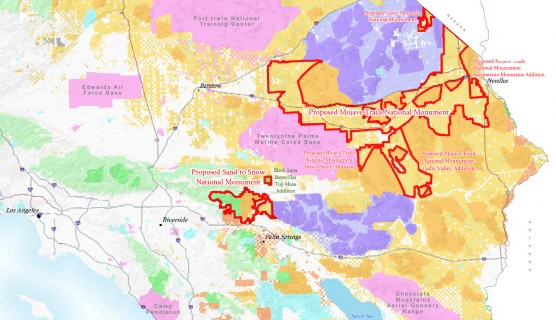
Sen. Dianne Feinstein, D-Calif.
[Washington, D.C.] – Sen. Dianne Feinstein, D-Calif., will host a public meeting Tuesday on three proposed national monument designations in the California desert. The meeting will take place at the Wildlands Conservancy’s Whitewater Preserve at 2 p.m. near Palm Springs and is open to the public.
On August 3, Feinstein sent a letter to President Obama requesting he use his authority under the Antiquities Act to designate three new national monuments: Mojave Trails, Sand to Snow and Castle Mountains.
This request is consistent with the senator’s longstanding efforts to protect these areas legislatively. Feinstein is committed to hearing local community voices on their conservation goals for these areas and has invited senior administration officials to be present at the public meeting.
“The California desert is a magnificent national treasure, and I won’t rest in my efforts to ensure it stays that way for generations to come,” said Feinstein. “Critical parts of the desert are at risk and need our support.”
* Statewide California map
* Southern California map
* Proposed Mojave Trails National Monument
* Proposed Sand to Snow National Monument
* Proposed Castle Mountains National Monument
WHAT: Public meeting on proposed Mojave Trails, Sand to Snow and Castle Mountains national monuments.
WHEN: Tuesday, October 13, at 2 p.m.
WHERE: The Wildlands Conservancy’s Whitewater Preserve, 9160 Whitewater Canyon Road, Whitewater, Calif. 92282
WHO: Senator Feinstein has invited the following individuals to deliver remarks:
U.S. Department of the Interior Deputy Secretary Mike Connor
U.S. Department of Agriculture Under Secretary for Natural Resources and Environment Robert Bonnie
Other senior administration officials
Rep. Raul Ruiz (D-Calif.)
Rep. Paul Cook (R-Calif.)
Rep. Pete Aguilar (D-Calif.)
California Natural Resources Secretary John Laird
Wildlands Conservancy Executive Director David Myers
San Bernardino County Board of Supervisors Chairman James Ramos
Riverside County Board of Supervisors Chairman Marion Ashley
Fort Mojave Indian Tribe Chairman Timothy Williams
Spokesman for the California Off-Road Vehicle Association Randy Banis
Like this:
Like Loading...
Related





 Tweet This
Tweet This Facebook
Facebook Digg This
Digg This Bookmark
Bookmark Stumble
Stumble RSS
RSS



























REAL NAMES ONLY: All posters must use their real individual or business name. This applies equally to Twitter account holders who use a nickname.
2 Comments
http://www.heritage.org/research/reports/2015/03/the-antiquated-act-time-to-repeal-the-antiquities-act
Following is an excerpt from this piece:
The Antiquated Act: Time to Repeal the Antiquities Act
By Nicolas Loris
Abstract
For more than a century, the President of the United States has had the power to unilaterally designate land as a national monument without input from Congress or the states. The Antiquities Act of 1906 originally served as a means for the President to quickly designate land to prevent looting of archaeological sites. However, Presidents from both parties have abused the power to place restrictions on land use. This practice prohibits or restricts economic opportunity, removes decision making from states and private citizens, and often does more environmental harm than good. President Barack Obama’s recent proclamation of three national monuments in the United States should serve as a reminder that the Antiquities Act is no longer needed and that Congress should repeal the President’s authority to designate national monuments.
President Barack Obama recently designated three national monuments in Colorado, Hawaii, and Illinois.[1] Under the Antiquities Act,[2] the President can designate areas as “national monuments” without congressional approval. Both Democratic and Republican Administrations have unilaterally used the Antiquities Act to restrict land use without input from Congress, the states, or their citizens.
Congress should repeal the Antiquities Act and devolve land management decisions to the states. At the very least, any national monument designation should require congressional approval and approval of the state(s) where the proposed national monument would be located.
More from the above article
Adds to the problem of government mismanagement of federal land.
The President’s ability to designate national monuments likely does more environmental harm than good. America’s largest land holder, the Department of the Interior (DOI), has a maintenance backlog of $13.5 billion to $20 billion for the land it already owns—a deficit leading to environmental degradation, soil erosion, gross amounts of littering, and land mismanagement.[11] While the Antiquities Act does not take more acreage into federal possession, designating a national monument places additional burdens on an overstretched DOI. The solution is not to throw more money at the problem by increasing budgets, but to transfer responsibility to state and local governments and private actors. They are the parties closest to the issue who can prioritize problems, solve them effectively, and properly weigh the needs and desires of local communities.[12]